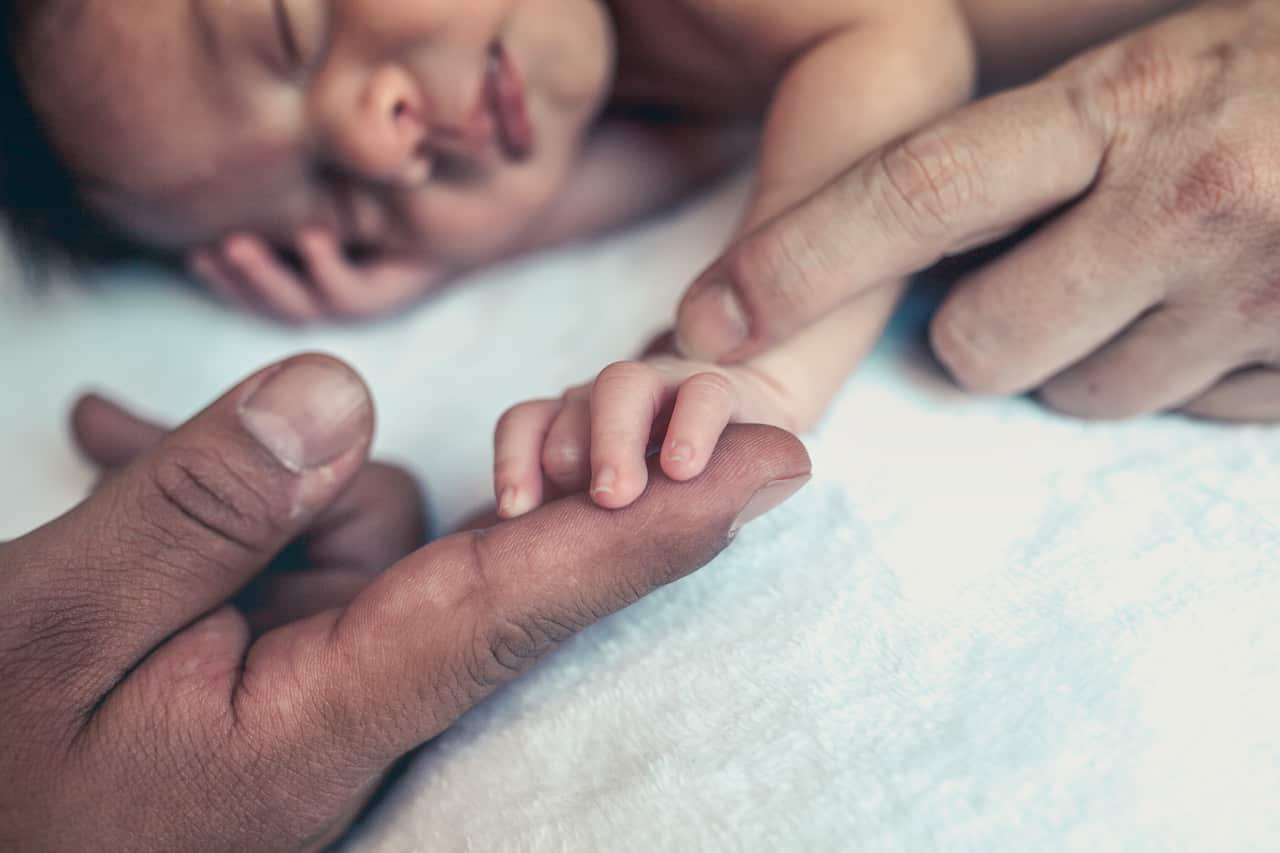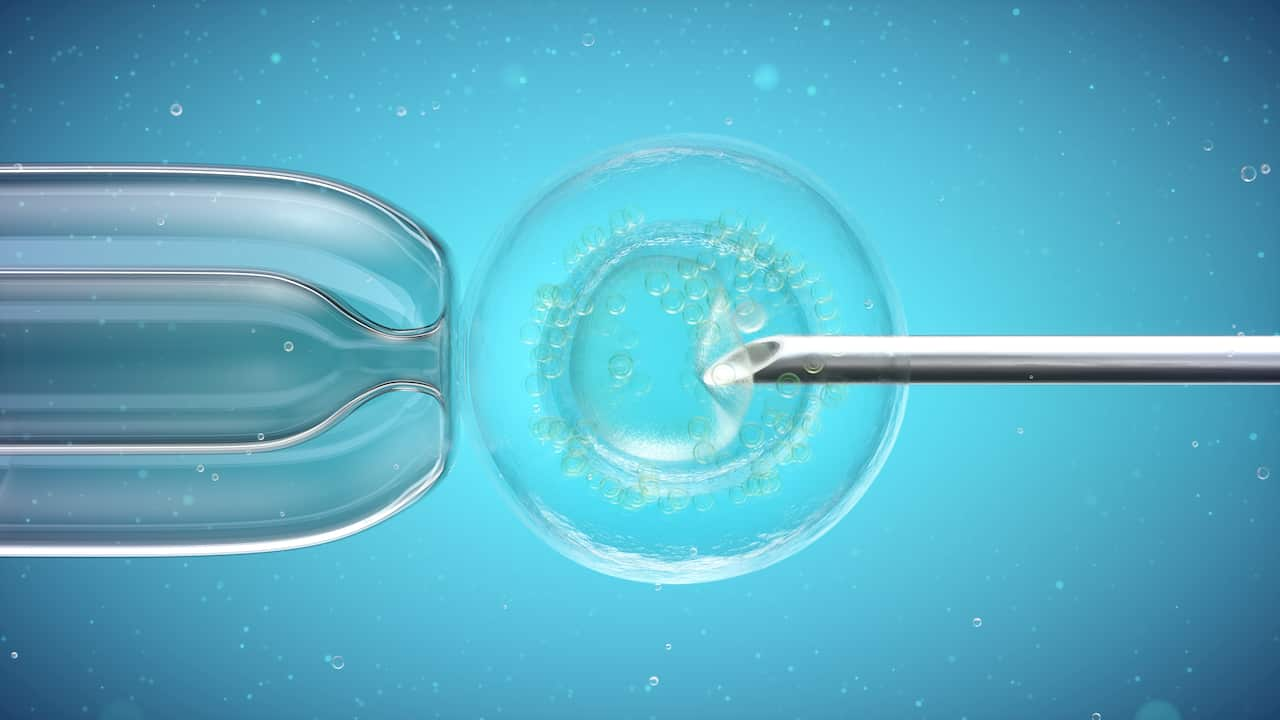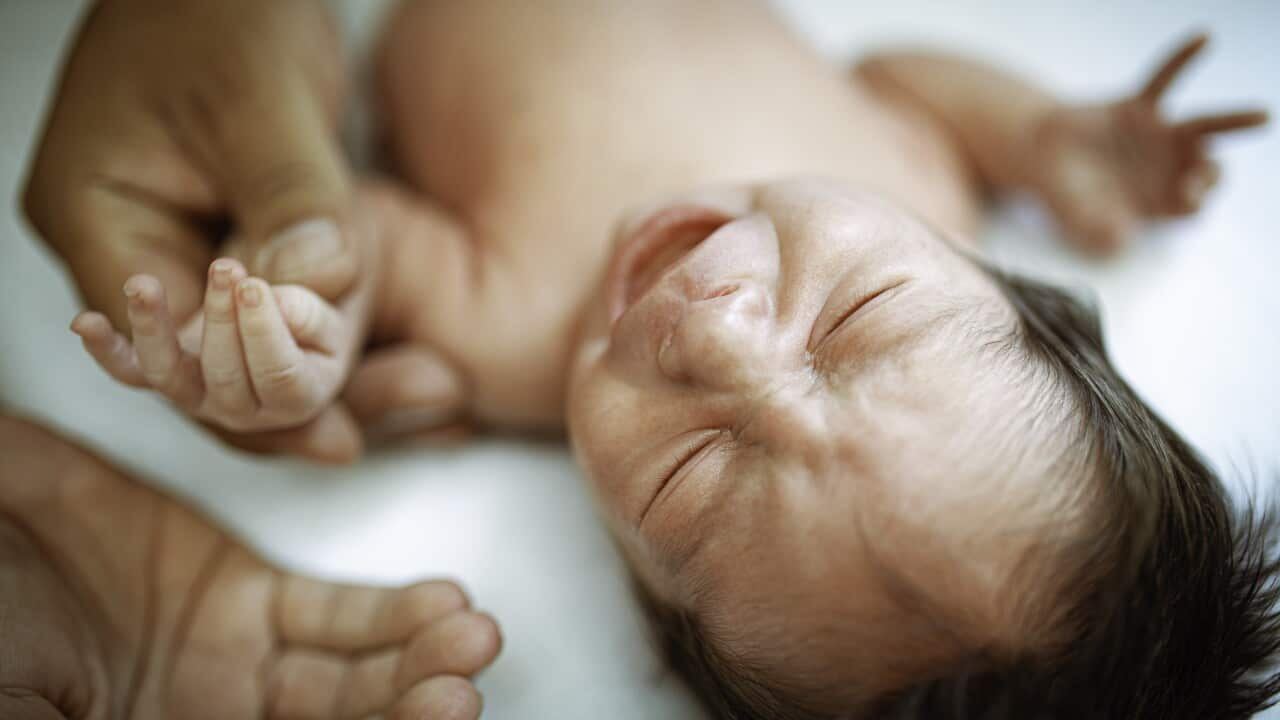Carla had her first daughter at 42, after attempting seven other times through artificial insemination.
She and her husband say that, after they got married, family and friends kept pushing them to have children.
Tatiana spoke to us from hospital, a day before giving birth to her son who was conceived by artificial insemination from an anonymous donor.
Our third interviewee, Thais, tell us they are looking for a gay couple who can donate their sperm to her and her wife so both can experience pregnancy.
They also intend on becoming surrogate mothers to other gay couples, and share the happinness they so want to experience.
It is not co-parenting, but a friendship between the two families, we are only looking at the wellbeing of the childrenThais

Na Austrália, ao completar 18 anos, toda criança nascida via doação de material genético, tem o direito garantido por lei de acessar os dados do doador para possivelmente conhecê-los, caso desejarem. Source: Moment RF / ©fitopardo/Getty Images
Tatiana Albano, 38, is a Brazilian chef. She is married to Bette, for five years.
Both have been living in Sydney for more than eight years now. When they decided to become mothers, they imported sperm from an American bank, and Ms Albano got pregnant on the second attempt by performing the process in clinic in Brazil.
By the first month of pregnancy, they came back to Australia.
Ms Albano spoke to us while still at the hospital in Sydney a day before her son's 'Benício', birth.

Tatiana and Bette with baby Benício: 'proud and happy to have him'
Be a good parent, regardless of sexual orientation or how the child was conceived, naturally, artificially, through donations or IVF. You don't have to understand, but you must respect this important decision in a couple's life, no matter your colour, nationality, creed or sexual identityTatyana Albano
“Being an Afro-american woman, lesbian, immigrant — and now mother — makes me proud and happy. My wife also wants to get pregnant soon. This is that maternal instinct every woman have, gently carrying and nurturing another life inside of you. Adopting may also be a possibility".
The choice of an anonymous donor in a clinic
Ms Albano talked about the process of choosing a donor.
"Our donor is anonymous and was chosen from a catalogue in an American clinic, with some of the father's genetic and physical info and also emotional traits.
"In this process, we're able to choose eye colour, hair colour, nationality, profession, and also personality traits of the donor. My wife is Australian, but comes from an Asian background, so we decided to choose a Chinese donor so that the child could be born with features like ours".

All available treatments on IVF do not guarantee a pregnancy. Source: Moment RF / xia yuan/Getty Images
In this case, however, Ms Albano imported the sperm from the US, and the country allows the donor not to reveal his identity.
Ms Albano's donor decided to stay anonymous. When time comes to tell about the father, she will say that the baby was conceived via artificial insemination.
I'm going to tell our baby the truth. Our son's education will be based on transparency. We want him to know about the whole process early on. I'll say it again: love, dedication, honesty and transparency are the base of everythingTatiana Albano
Alopecia following pregnancy
Carla Corby, 56, a Brazilian innovation manager in Sydney, and was able to conceive at the age of 42.
Her daughter is now 14.

Ms Corby and daughter: after trying to conceive naturally for three years, Carla and husband decided to look for a fertility specialist
After trying to conceive naturally for three years, she and her husband decided to look for a fertility specialist in Sydney. They chose IVF and tried seven times until Ms Corby finally got pregnant.
If I have to describe it, it's been a roller coaster. The treatment involves injections, egg sampling, embryo transfers, blood tests, and lots of appointments every week. I would go to the clinic at 7 am before work. Sometimes, I had to inject myself with medicine, I would do it at my office's restroom. I would also often leave my job at lunch in a hurry to get ultrasound scans. No one at work knew itCarla Corby
According to Ms Corby's physician, the post-traumatic stress after she gave birth made her body develop an autoimmune response.
"I developed Alopecia [hair loss] right after the process. This is a condition caused by emotional trauma", she adds.
Sometimes, it is hard to talk about it
Despite it all, Ms Corby says she doesn't regret the journey. On hindsight, she would only change one thing and have sought an opinion from a fertility specialist earlier.
I never imagined I would have complications in getting pregnant, because all my doctors told me I was fertile. It is important to get as much information as much as you can. Listen to your doctors, but, at the same time, do your own research.Carla
“Sometimes, it's hard to share your experience with people who did not go through same process. Now we have lots of Facebook groups in which people share their experiences and advice. Remember: your man may also be infertile, so both of you need to do some tests and research what's happening inside your bodies".
Choosing an identified donor
Brazilian manager Thais Granado, 30, and wife Whitney, both from Western Australia, found a group on Facebook called .
They changed plans and decided to look for someone non-anonymously instead of undergoing IVF. Therefore, both could become pregnant.

Thais Granado and wife Whitney.
"We're trying to be a lot less selfish here and thinking on the children, how they're gonna feel if that part of their lives is taken from them".
Artificial insemination at home
According to Adam Hooper, creator of Sperm Donation Australia, more than 3,000 children were born through the group's efforts.
SDA connects straight and gay couples and mothers who are willing to navigate the process solo. People are allowed to meet and even develop a friendship.
What most people don't know is that you don't need a clinic to intermediate: everything can be done at home through artificial insemination — or natural insemination if both parties agree to have sexual intercourse.

Sperm Donation Australia has more than 16,000 members, and a backlog of people waiting to join.
Success rates
According to Dr Alex Polyakov, associate professor at the University of Melbourne and specialist at , all available treatments on IVF do not guarantee a pregnancy, as this is a very complex medical procedure.
“The success rate of IVF treatments in Australia varies depending on several factors such as age, underlying medical conditions, and the cause of infertility. The average success rate of a fresh IVF cycle in Australia is approximately 33% for women under the age of 35. For women aged between 35-39, the success rate is around 27%, and for women aged 40 and above, the success rate drops to approximately 13%”.
My advice to individuals or couples looking for sperm donors, egg donors, or IVF treatments is to start by educating themselves on the process and their options. It is important to understand the potential success rates and any risks involved. It is also crucial to find a reputable and experienced fertility clinic that can provide personalised care and support throughout the processDr. Alex Polyakov
“Additionally, it is important to have realistic expectations and understand that IVF treatments may not always result in a successful pregnancy. Emotional and financial support is also important, as the process can be physically and mentally demanding”.
*Author: Felippe Canale
*Online producer: Jason Mathias.
Siga ano , e e ouça . Escute a
ao vivo às quartas e domingos ao meio-dia ou na hora que quiser na






